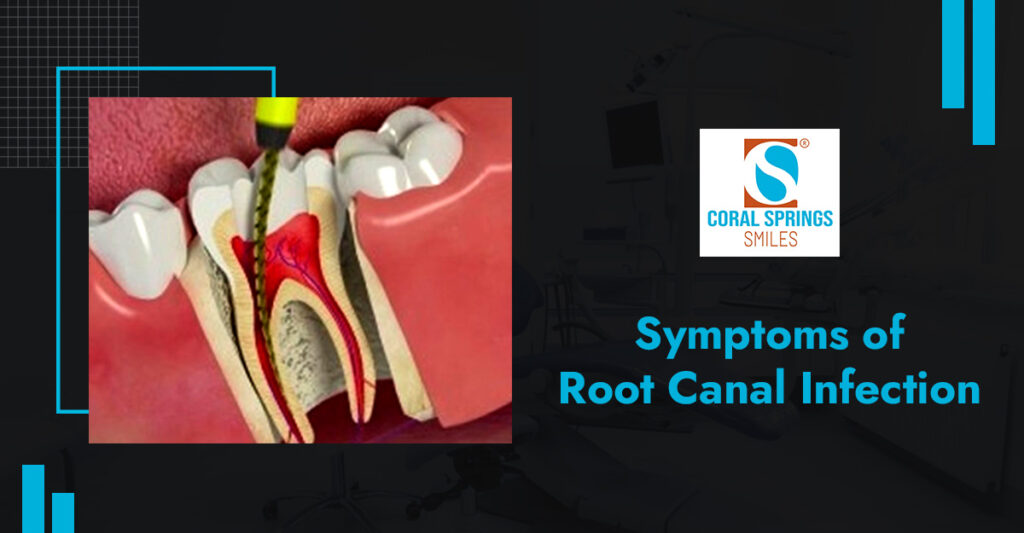
Root canals are a common dental procedure that saves teeth by removing infected pulp, the inner tissue. While the procedure itself is effective, there’s a slight chance an infection can develop even after a root canal. If this happens, it’s important to get it treated quickly to avoid further complications. This blog will explore the symptoms of a root canal infection and what to do if you experience them.
Understanding Root Canal Infections
Inside your tooth, there’s a soft tissue layer called the pulp. This pulp contains nerves, blood vessels, and connective tissues that help your tooth grow and develop. If bacteria enter the pulp through a cavity, crack, or other damage, it can become infected. This infection can then spread to the root of the tooth and the jawbone.
A root canal treatment removes the infected pulp and cleans the canals inside the root. The dentist then seals the tooth to prevent further infection. However, in some cases, the infection may persist or come back.
Symptoms to Watch Out For
If you’ve had a root canal and think you might have an infection, be aware of these common symptoms:
- Pain: This is often the most noticeable symptom. You might experience throbbing pain, sharp pain, or a dull ache in the area of the treated tooth. The pain may worsen when you bite down or chew, or when exposed to hot or cold temperatures.
- Sensitivity: Your tooth may become hypersensitive to hot and cold drinks or food, even lingering long after consuming them.
- Swelling: The gum tissue around the infected tooth may become swollen, red, and tender. In severe cases, swelling may extend to your face or jaw.
- Abscess: An abscess is a pus-filled pocket that forms at the tip of the tooth’s root. This can cause significant pain, swelling, and tenderness in the surrounding area. You might even see a pimple-like bump on your gum.
- Discoloration: The infected tooth may darken or become discolored over time.
- Bad Breath: A persistent bad breath or a foul taste in your mouth can indicate an infection. Brushing and flossing won’t get rid of this type of bad breath.
- Fatigue: Though less common, some people may experience fatigue alongside other symptoms of a root canal infection.
What to Do if You Have Symptoms
If you experience any of these symptoms after a root canal, it’s crucial to see a dentist as soon as possible. Early diagnosis and treatment can prevent the infection from spreading and causing further damage to your tooth and jawbone. Here’s what to expect:
- Examination: Dentist will examine your mouth, including the treated tooth and surrounding tissues. They may also take X-rays to get a better view of the root and jawbone.
- Treatment: Depending on the severity of the infection, dentist might choose one of these options:
- Antibiotics: These medications help fight the infection, usually prescribed alongside other treatments.
- Root canal retreatment: In some cases, the dentist may need to reopen the tooth and clean out the canals again. They may also use medication to kill any remaining bacteria.
- Extraction: If the infection is severe or the tooth is too damaged, the dentist might recommend extraction. This would be followed by a discussion about replacing the missing tooth with an implant or bridge.
Preventing Root Canal Infections
Here are some tips to help prevent a root canal infection from developing in the first place:
- Maintain good oral hygiene: Brushing twice a day, flossing daily, and using mouthwash can help remove bacteria and plaque that contribute to tooth decay.
- Schedule regular dental checkups and cleanings: Regular dental visits allow dentists to identify and address any potential problems early on.
- Treat cavities promptly: Don’t ignore cavities. The sooner they are treated, the less likely they are to lead to an infection.
- Wear a mouthguard: If you play sports or grind your teeth, wear a mouthguard to protect your teeth from injury.
- Tell your dentist about any pain or sensitivity: If you experience any pain or sensitivity in your teeth, let the dentist know right away.
Conclusion
Root canal infections can occur even after a successful root canal procedure. If you experience any of the symptoms mentioned above, be sure to see your dentist promptly for a diagnosis and treatment plan. Early intervention is key to preventing complications and saving your tooth. Remember, good oral hygiene and regular dental checkups are your best defense against root canal infections and other dental problems.
If you’re experiencing any of these symptoms after a root canal, don’t hesitate to contact our dental office, Coral Springs Smiles. Early diagnosis and treatment are key to a successful outcome. We offer convenient appointment scheduling and are dedicated to providing you with the best possible care. Call us today at (954) 266-8755.



